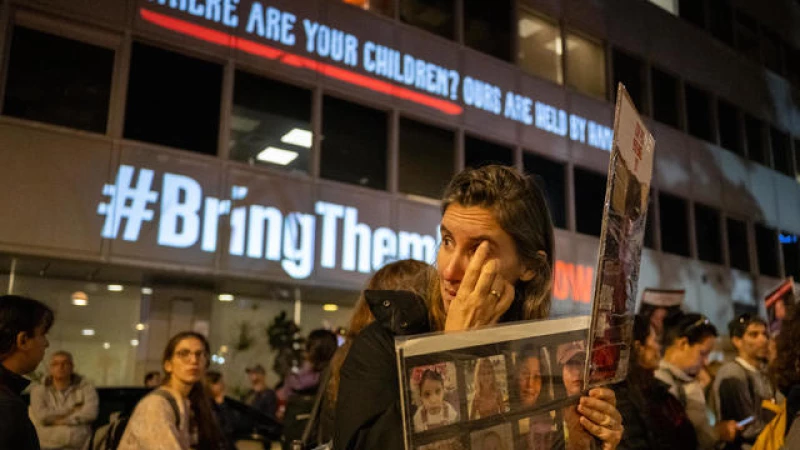The Gaza Crisis: Calls for Cease-Fire Intensify
The Gaza Strip has been devastated by the ongoing conflict between Israel and Hamas, with officials in the Hamas-run Palestinian territory reporting a death toll of approximately 13,000 people. The situation for more than 2 million civilians trapped in the enclave has become increasingly dire.
As a result, there has been a growing demand for a cease-fire in the Israel-Hamas war. Representatives from both sides have been engaged in complex negotiations in Qatar, working tirelessly to reach an agreement.
In response to Hamas' bloody terror attack on October 7, which claimed the lives of around 1,200 people and led to the militants taking approximately 240 hostages, Israel launched a blistering offensive against the group in Gaza.
Senior Hamas representatives and Western officials, including President Biden, have expressed optimism that an agreement is within reach. It is likely that a temporary cease-fire of approximately five days will be established, with Hamas releasing some of the hostages and Israel freeing a portion of the hundreds of Palestinians held in its prisons.
Despite these positive indications, several draft agreements for a halt in the fighting have collapsed at the last minute. Therefore, there is no guarantee that thousands of displaced families in Gaza, who are currently living in squalid conditions within a war zone, will experience immediate relief. Additionally, the dozens of Israeli families desperate to secure the release of their kidnapped loved ones remain in a state of uncertainty.
CBS News producer Marwan al-Ghoul witnessed the dire conditions faced by displaced Palestinian families in southern Gaza. These families were huddled in makeshift tents, with their children wet and shivering from the cold.
One mother questioned why the Israeli military operation, which they claim is targeting only Hamas and extremists, did not provide camps for the displaced families if their intention was to displace them from their homes and land.
The woman told Al-Ghoul that they had not had any food for three days, not even a piece of bread. They also lacked access to water, as the rain poured into their tents, turning the ground into muddy water. With the rain continuing and temperatures dropping, these families are in desperate need of a ceasefire to allow humanitarian aid into Gaza.
Meanwhile, across the border in Israel, the families of approximately 240 hostages held by Hamas were anxiously waiting for news of a potential deal on Tuesday.
Children Held in Gaza: Families Demand Rescue
There are children, even toddlers and babies among those believed to be held in Gaza by Hamas and possibly other groups, and some of their families gathered in front of a United Nations' office in Israel Monday to demand that someone do something to rescue their kids. With no certainty about any potential hostage release, they asked Israel's government, the U.S., even the U.N. — anyone willing to listen — to bring their children home.
Hadas Kalderon, whose mother was killed on Oct. 7 and whose 12-year-old son Erez and 16-year-old daughter Sahar were captured, was at the demonstration, knowing that every second without a deal could prove lethal.
She told CBS News she'd received no word at all about the fate of her children since they were abducted by Hamas, which has long been designated a terrorist organization by Israel, the U.S. and many other nations.
"I don't have information," Kalderon said, adding that any information she and the other families did receive seemed, "not relevant, because every moment, it can be changed. One moment, you're alive. One moment, you're not here. It doesn't matter."
With Israeli airstrikes continuing across Gaza and the whereabouts of the hostages in the densely populated enclave unclear, the mother said she was "worried about everything," from disease spreading amid the dire humanitarian conditions on the ground, to bombs falling from the air.
"They are in the middle of a war. How come?" she asked. "Of course, I don't sleep. I don't eat."
The politicians involved in the cease-fire and hostage negotiations have a moral and political obligation to bring them home as soon as possible. The government leaders must sign the deal and make it happen.
Although senior Hamas officials have stated that the terms of a cease-fire agreement have been agreed upon, there has been no confirmation from Israeli officials on whether the government has signed off on a final deal. Any potential agreement between the warring sides could be derailed by events on the ground in the volatile region.
Groups backed by Iran, such as Hezbollah in Lebanon and the Houthi movement in Yemen, have been threatening to join the war for weeks. Recently, the Hezbollah-linked TV network Al-Mayadeen reported that two of its journalists and a civilian were killed in a "cowardly Israeli attack in South Lebanon."
The Israel Defense Forces released a statement saying that its aircraft had targeted and struck three armed terrorist cells in the border area with Lebanon on Tuesday. This action was in response to the terrorists firing mortar shells at an IDF post in northern Israel.







